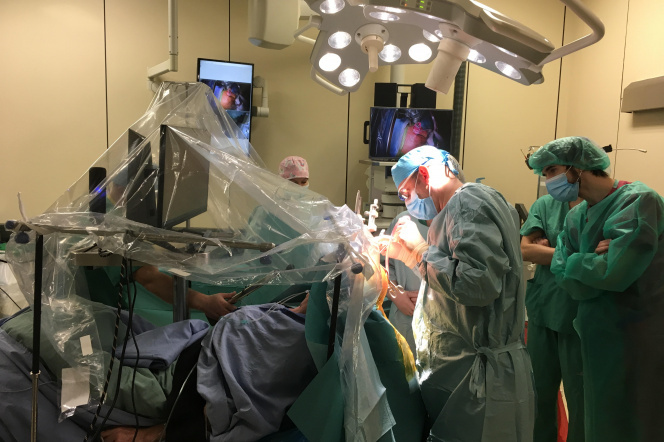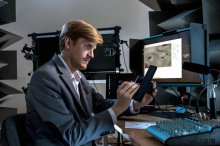Date added: 2021-03-12
Pioneer brain surgery with the participation of Michał Kucewicz, PhD from Gdańsk Tech

The research carried out by PhD Michał Kucewicz and his participation in the complicated operation were possible thanks to the First Team project of the Foundation for Polish Science, implemented as part of the cooperation of the Brain and Mind Electrophysiology Laboratory (operating within the Department of Multimedia Systems FETI, under the aegis of the BioTechMed Gdańsk Tech Center), Mayo Clinic medical center (Rochester, USA) and the Medical University of Silesian Piasts in Wrocław.
During the operation, the conscious patient performed tasks requiring memory involvement using the eye tracking technique and software inspired by the ‘CyberEye’ technology previously developed at the DMS by a team led by prof. Andrzej Czyżewski. The equipment used for the study was purchased from the project funds.
– We took the unique opportunity to record the activity of the brain, eye movements and the constriction and dilatation of the pupils using an advanced eye tracking system operating on the ‘CyberEye’ principle: with a special infrared camera and a computer monitor placed in front of the patient during the operation – explains PhD Michał Kucewicz, who deals with the study of human consciousness and the mechanisms of human memory in his scientific work and as part of the activity of the Brain and Mind Electrophysiology Lab (Gdańsk Tech).
– Research of this type, using special electrodes deeply implanted and intraoperative memory tests with eye tracking, are groundbreaking, both on a national and international scale - emphasizes Prof. Andrzej Czyżewski, head of the Department of Multimedia Systems at Gdańsk Tech.
The first such operation in Poland
This type of operation took place for the first time in Poland, also thanks to the opportunity to purchase specialized equipment for recording brain waves from the FNP grant and thanks to the joint efforts of a team of neurosurgeons, neurologists, biomedical engineers and neuroscientists. The social significance of PhD Michał Kucewicz's research consists, among others, in the transfer to Poland of the new, American methodology of implanting and monitoring the work of the brain, and in learning about the mechanisms of human memory functioning on this basis.
In an experiment conducted during the operation at the University Teaching Hospital of Jan Mikulicz in Wrocław, under the supervision of prof. Paweł Tabakow and his team, PhD Michał Kucewicz recorded the data during the stimulation of the patient's brain. This data will then be analyzed in the context of understanding the deep structures of the brain and stimulation methods that could improve not only the mobility of disabled patients, but also their cognitive functions, such as memory.
This is in line with the assumptions of the Brain and Mind Electrophysiology Laboratory, which introduces research on technologies for improving memory for the treatment of brain diseases. Recordings of signals from electrodes implanted in the brain were an element of the therapy of Parkinson's disease symptoms and movement disorders using the so-called Deep Brain Stimulation (DBS). In this therapy, electrical stimulation is carried out with the help of special electrodes implanted in the conscious patient's brain, performing various motor tasks to assess the immediate effects of stimulation in the operating room.


